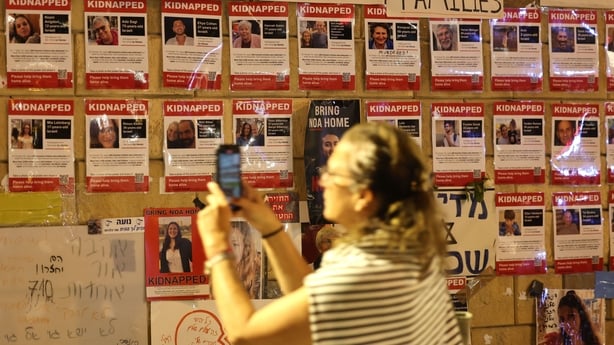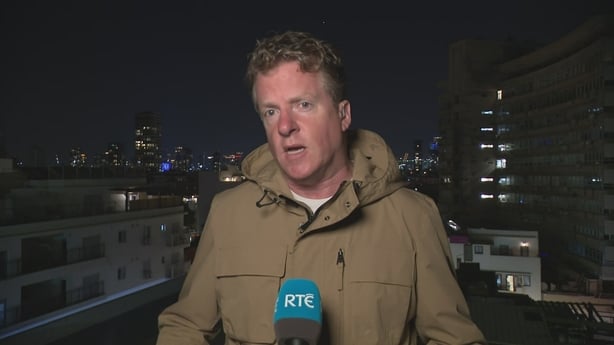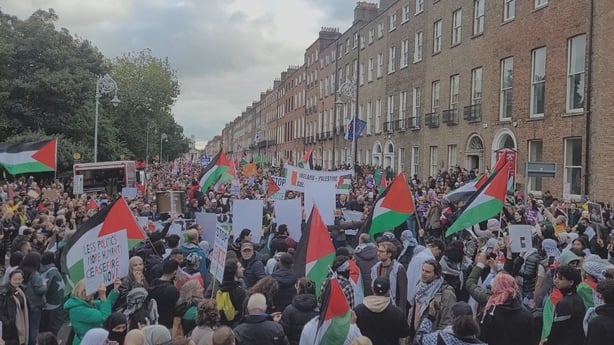The man with the silver hair and sky blue shirt walked up to me in downtown Tel Aviv last Thursday and inquired, gently, what country I hailed from.
"Ireland," I said. He shook his head. "You are not with us," he replied, emphasising the final two words.
Calmly, but with serious intent, he decried the Irish Government's position on Israel by saying that politicians do not know what they are talking about.
The Irish media are just as bad, he said looking directly into my eyes.
We were standing to the side of a demonstration in support of the more than 200 hostages who are being held by Hamas in Gaza.
On the streets where we stood, family members of those kidnapped mingled with a larger number of people who wanted to offer them their support.
I asked the man if he would like to do an interview about his views on Ireland but he declined, saying it would be inappropriate to comment at such a gathering. The day belonged to the families.
But he informed me that his brother, a soldier, had been listed as missing in Egypt after the Yom Kippur war in 1973. He knew what these families were going through.
Though reluctant to speak on the record, he did want to put me straight about Israel and what he saw as Ireland's failures.
He contended that Ireland was "indirectly responsible" for the war in Gaza through its blind support for the Palestinian position.
He had a particular anathema for what he viewed as a media trope that there were two sides to the current conflict in Gaza.
There is Israel, he said, and then there is the butcherers.

'Fake nonsense'
This argument of false equivalence, while not new, had been advanced publicly earlier that day by the Israeli Defence Forces spokesman Jonathan Conricus, in his daily online news update.
The Lieutenant Colonel said he wanted to debunk "fake nonsense" being advanced by Hamas to a gullible media regarding the deadly strike on the Al-Ahli hospital in Gaza city.
He said it was absurd that Israel's word would be held in parity with that of Hamas.
From conversations cameraman Owen Corcoran and I had with people in Tel Aviv and Jerusalem over the past week, it is pretty clear that many Israelis believe that Ireland is a country which falls into the "Hamas trap."
When asked what country I come from by Israelis, the answer "Ireland" is generally met by a brief pause and, if I read their expressions correctly, a conclusion that I was not an ally.
This is despite the fact that the Taoiseach Leo Varadkar has unequivocally condemned the "appalling" attack by Hamas on Israeli citizens and Tánaiste Micheál Martin has reconfirmed the Irish position that Israel has the right to defend itself.
The fault line appears when the Irish government states that any Israeli Defence Force response be "proportionate".
Many Israelis see this as a bogus demand when they face an existential threat from Hamas.

'Palestinian propaganda'
As we filmed in Tel Aviv a few days ago we were approached by another Israeli citizen.
This man wanted to engage me on Ireland's position on the question of Israel, Palestine and the two state solution.
Well-informed on Irish history and media, he said he knew about RTÉ, the Irish Times and the Irish Independent. He spoke about Charles Stewart Parnell and Daniel O'Connell.
He told me he had been to Ireland and could not believe what he had read and what he had heard - "Palestinian propaganda".
I decided to run these views past an Irishman who has been living in Israel for the past 15 years.
He told me it was a generally held view among Israelis that neither the politicians nor the media in Ireland are fair-minded.
Word trickling back from Israelis, he said, who had picked-up jobs in the tech sector in Dublin over the past few years, was one of disbelief at the tenor of political debates in the Dáil and Seanad.
Some of the pro-Palestinian demonstrations, they found, were alarming.
He said the new Israeli arrivals in Ireland cannot understand how reports from Hamas, that had just carried out an horrendous massacre on civilians, are automatically held up as the truth whereas the information provided by Israel is treated with the utmost suspicion.
They are at a complete loss, he added, as to how this can be when one is a terror organisation and the other is a democratic state.

Daily risks
It would be simplistic to conclude that Israelis do not like Ireland.
Many have an affinity with this small country which also has a large footprint on the world stage; they visit and are often enchanted by the beauty of the landscape and the richness of our culture; and they too are known for their dark sense of humour.
When it comes to sport, a great many Israelis love nothing better than to see the green army descend on Tel Aviv and take-over bars like Molly Blooms near the seafront.
Win, lose or draw - the Irish desire to engage, have the craic and party along the length of Mendeli Street has won hearts and minds across the country
But they do not feel Irish people understand the daily risks they run.
For example, they have apps on their phones, which ring several times a day, to alert them that they must run to the bomb shelters because Hamas is firing rockets indiscriminately into their villages, towns and cities.
It is proof, they say, that Hamas wants to wipe them off the map - just as its fighters proved again on 7 October in southern Israel.
These views are not limited to the man and woman on the street but are etched on the minds of those at the highest level in the Israeli government.
Of 'Western’ governments, the Irish Government is regarded as the most hostile to Israel.
Its coalition Government, like its predecessors, is seen by Israel to be far too quick to remind them of their obligations under international law, an approach not taken with other countries.
As he turned to walk back to the demonstration, the silver-haired man in the blue shirt repeated what he had said at the beginning of our conversation: "You are not with us."
Then he added: "And we know it."







